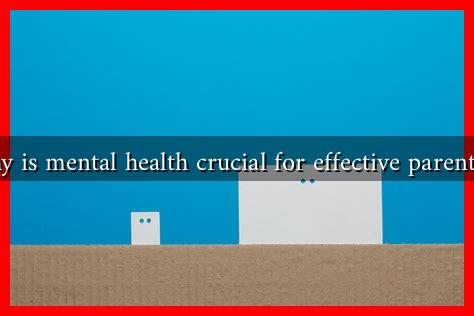-
Table of Contents
Why is Mental Health Crucial for Effective Parenting
Parenting is one of the most rewarding yet challenging roles a person can undertake. It requires not only physical stamina but also emotional resilience and mental clarity. Mental health plays a pivotal role in effective parenting, influencing how parents interact with their children, manage stress, and foster a nurturing environment. This article explores the importance of mental health in parenting, supported by research, statistics, and real-life examples.
The Link Between Mental Health and Parenting
Mental health encompasses emotional, psychological, and social well-being. It affects how we think, feel, and act, and it plays a significant role in how we handle stress, relate to others, and make choices. For parents, maintaining good mental health is essential for several reasons:
- Emotional Availability: Parents with good mental health are more emotionally available to their children. They can engage in meaningful conversations, provide comfort, and respond to their children’s needs effectively.
- Stress Management: Parenting can be stressful. Parents who prioritize their mental health are better equipped to manage stress, reducing the likelihood of negative interactions with their children.
- Modeling Behavior: Children learn by observing their parents. Parents who demonstrate healthy coping mechanisms and emotional regulation teach their children valuable life skills.
Statistics Highlighting the Importance of Mental Health in Parenting
Research underscores the critical connection between mental health and parenting effectiveness. According to the National Institute of Mental Health (NIMH), approximately 1 in 5 adults in the U.S. experience mental illness in a given year. This statistic is particularly concerning for parents, as untreated mental health issues can lead to:
- Increased risk of child behavioral problems
- Higher rates of child abuse and neglect
- Impaired parent-child bonding
A study published in the journal Child Development found that children of parents with untreated mental health issues are more likely to develop emotional and behavioral problems themselves. This cycle can perpetuate across generations, making it crucial for parents to seek help when needed.
Real-Life Examples and Case Studies
Consider the case of Sarah, a single mother struggling with depression. Her mental health challenges made it difficult for her to engage with her two children. As a result, they often felt neglected and developed behavioral issues at school. After seeking therapy and support, Sarah learned coping strategies that improved her mental health. Consequently, her relationship with her children flourished, leading to better emotional outcomes for all three of them.
Another example is John, a father who experienced anxiety. Initially, he found it hard to participate in family activities, fearing he would embarrass himself. After joining a support group, John learned to manage his anxiety and became more involved in his children’s lives, leading to a stronger family bond.
Strategies for Maintaining Mental Health as a Parent
Maintaining mental health is an ongoing process, especially for parents. Here are some effective strategies:
- Seek Professional Help: Don’t hesitate to consult a mental health professional if you’re struggling. Therapy can provide valuable tools for managing stress and emotions.
- Practice Self-Care: Prioritize activities that promote your well-being, such as exercise, hobbies, or relaxation techniques.
- Build a Support Network: Surround yourself with supportive friends and family who can offer help and encouragement.
- Communicate Openly: Share your feelings with your partner or trusted friends. Open communication can alleviate stress and foster understanding.
Conclusion
Mental health is not just an individual concern; it is a family matter that significantly impacts parenting effectiveness. Parents who prioritize their mental well-being create a nurturing environment that fosters healthy emotional and behavioral development in their children. By recognizing the importance of mental health, seeking help when needed, and implementing effective strategies, parents can break the cycle of mental health issues and promote a healthier future for their families. Remember, taking care of your mental health is not a sign of weakness; it is a vital step toward becoming the best parent you can be.
For more information on mental health resources, visit the National Alliance on Mental Illness (NAMI).


